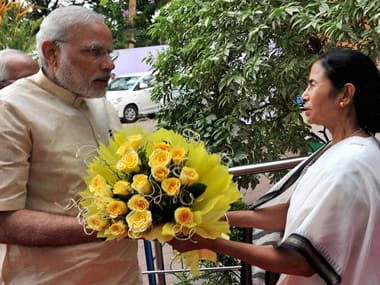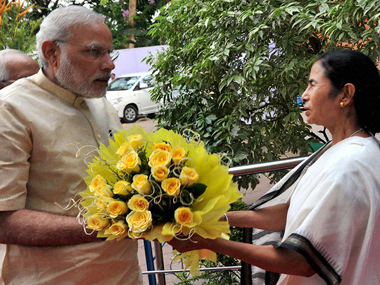The Mamata Banerjee-Narendra Modi thaw – evident last Saturday when the Prime Minister and the West Bengal Chief Minister shared the stage in Kolkata during the launch of three social sector schemes - will be widely seen as being the result of a behind-the-scenes political understanding. We cannot deny that possibility, but the reason for this apparent cordiality is that the objective circumstances have changed. Both now see as much benefit in cooperation as confrontation. [caption id=“attachment_2237780” align=“alignleft” width=“380”]
 West Bengal Chief Minister Mamata Banerjee with PM Narendra Modi. PTI[/caption] Freshly confident after her resounding victories in the Kolkata Municipal Corporation and local body elections in West Bengal, Mamata has got over her fear of Modi and the BJP – a fear created after the party’s creditable showing in the Lok Sabha polls. It is now clear that the BJP’s surge in May 2014 and its efforts to build a viable opposition to the Trinamool Congress in West Bengal are two different things. The former was one-off; the latter a work-in-progress. The reason why Modi and Mamata no longer see themselves as permanent enemies is that both now realise that they have their own spheres of supremacy. Neither is an immediate threat to the other politically. When political insecurity ends, many things are possible, including the possibility of collaboration for mutual benefit in some areas. Modi found an unexpected ally in Trinamool while passing the Coal Mines and Minerals bills during the first part of the budget session; the Congress had to abandon its opposition due to this willingness of Mamata to sup with the Devil. The Trinamool opposition ended when Mamata Bannerjee realised that West Bengal would be one of the biggest beneficiaries of these two bills. As for Modi, the benefits of prising the regional parties away from the Congress’ leadership are obvious. The Congress is providing the strongest opposition, for example, to the goods and services tax (especially the constitutional amendment), but West Bengal, as a potential big beneficiary in a consuming state, is an ally. The GST, when implemented, is expected to benefit consuming states more than manufacturing states, since GST is really a tax levied on the final consumer. So states which consumer more than they produce benefit more. The GST bill is touch and go in the Rajya Sabha, where the Congress and AIADMK want to delay it. The core opposition to the bill comes from the manufacturing states of Gujarat, Maharashtra and Tamil Nadu, but the former two are manageable because they are BJP-ruled. It is only Congress and AIADMK (and, possibly, the JDU) which could prove to be roadblocks. If Trinamool can be roped in to agree to the bill along with SP and BSP, there is a good chance that the bill can be passed despite the Congress opposition. It is not clear what J Jayalalithaa, now triumphant after her acquittal by the Karnataka High Court in a corruption case, will decide on GST. Given that the Modi government’s tax department agreed to settle another tax case involving Jaya, she should be willing to compromise. On Modi’s part, he has probably realised that there is strength in weakness. As long as the BJP was seen as threatening the dominance of the regional parties, the latter had no reason to cooperate with him. That phase ended with the BJP’s rout in Delhi. While the BJP in West Bengal is not going to die out any time soon, it is clear that the centre will not be instigating the local unit against the Trinamool Congress. The chances are in the 2016 state assembly elections, it is the Congress and the Left Front that may end up having an agreement to take on the Trinamool. Modi may also have realised that his success at the centre – particularly his ability to make changes in laws to boost growth – depends on separating the government’s priorities from the party’s growth agenda in states. It is by no means certain that this apparent thaw will hold indefinitely. Most probably it is a temporary truce, given that both centre and state need each other. But one can’t rule out legislative support from the Trinamool for many of the NDA’s bills – except the Land Acquisition Bill. For much of 2015, the unstated Modi-Mamata entente cordiale should endure. Once the Bengal elections are in sight, all bets are off.
West Bengal Chief Minister Mamata Banerjee with PM Narendra Modi. PTI[/caption] Freshly confident after her resounding victories in the Kolkata Municipal Corporation and local body elections in West Bengal, Mamata has got over her fear of Modi and the BJP – a fear created after the party’s creditable showing in the Lok Sabha polls. It is now clear that the BJP’s surge in May 2014 and its efforts to build a viable opposition to the Trinamool Congress in West Bengal are two different things. The former was one-off; the latter a work-in-progress. The reason why Modi and Mamata no longer see themselves as permanent enemies is that both now realise that they have their own spheres of supremacy. Neither is an immediate threat to the other politically. When political insecurity ends, many things are possible, including the possibility of collaboration for mutual benefit in some areas. Modi found an unexpected ally in Trinamool while passing the Coal Mines and Minerals bills during the first part of the budget session; the Congress had to abandon its opposition due to this willingness of Mamata to sup with the Devil. The Trinamool opposition ended when Mamata Bannerjee realised that West Bengal would be one of the biggest beneficiaries of these two bills. As for Modi, the benefits of prising the regional parties away from the Congress’ leadership are obvious. The Congress is providing the strongest opposition, for example, to the goods and services tax (especially the constitutional amendment), but West Bengal, as a potential big beneficiary in a consuming state, is an ally. The GST, when implemented, is expected to benefit consuming states more than manufacturing states, since GST is really a tax levied on the final consumer. So states which consumer more than they produce benefit more. The GST bill is touch and go in the Rajya Sabha, where the Congress and AIADMK want to delay it. The core opposition to the bill comes from the manufacturing states of Gujarat, Maharashtra and Tamil Nadu, but the former two are manageable because they are BJP-ruled. It is only Congress and AIADMK (and, possibly, the JDU) which could prove to be roadblocks. If Trinamool can be roped in to agree to the bill along with SP and BSP, there is a good chance that the bill can be passed despite the Congress opposition. It is not clear what J Jayalalithaa, now triumphant after her acquittal by the Karnataka High Court in a corruption case, will decide on GST. Given that the Modi government’s tax department agreed to settle another tax case involving Jaya, she should be willing to compromise. On Modi’s part, he has probably realised that there is strength in weakness. As long as the BJP was seen as threatening the dominance of the regional parties, the latter had no reason to cooperate with him. That phase ended with the BJP’s rout in Delhi. While the BJP in West Bengal is not going to die out any time soon, it is clear that the centre will not be instigating the local unit against the Trinamool Congress. The chances are in the 2016 state assembly elections, it is the Congress and the Left Front that may end up having an agreement to take on the Trinamool. Modi may also have realised that his success at the centre – particularly his ability to make changes in laws to boost growth – depends on separating the government’s priorities from the party’s growth agenda in states. It is by no means certain that this apparent thaw will hold indefinitely. Most probably it is a temporary truce, given that both centre and state need each other. But one can’t rule out legislative support from the Trinamool for many of the NDA’s bills – except the Land Acquisition Bill. For much of 2015, the unstated Modi-Mamata entente cordiale should endure. Once the Bengal elections are in sight, all bets are off.
Decoding Modi-Mamata cordiality: Fear is gone and truce is a better option
R Jagannathan
• May 12, 2015, 13:54:30 IST
The Mamata Banerjee-Narendra Modi thaw will be widely seen as being the result of a behind-the-scenes political understanding.
Advertisement
)